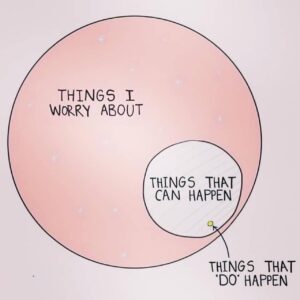 When a person experiences a tight chest, rapid heartbeat, tense arms, sweaty hands, inability to focus, and even fear of dying, it could be anxiety.
When a person experiences a tight chest, rapid heartbeat, tense arms, sweaty hands, inability to focus, and even fear of dying, it could be anxiety.
If you have these symptoms, go to your medical doctor to ensure a physical ailment is not the culprit. This will give you accurate information, not based on fear. It can also help alleviate the anxiety. If something physical is wrong, you need to know and treat it, and if there isn’t a medical problem, you can check that worry off your list.
Living with and controlling anxiety is possible, and here is a short list of skills:
Know and repeat regularly, “This (anxiety) is not pleasant, but it’s not going to kill me!”
Do a Google search. Knowledge helps control anxiety and diminishes the development of panic.
Anxiety is usually about fear—ask, “What am I afraid of?”
Anxiety is real and can be debilitating, preventing a person from participating in daily activities.
Make anxiety your friend. The more you fear and fight it, the more power it will have.
Welcome anxiety. Feel it and talk with it. Touch it. Give it a name. Anxiety might be a bad neighbor, but it is not a terrorist.
When you start feeling anxious, don’t forget to breathe.
Physically GO where you feel safe.
Sit if you need to.
Pull off to the side of the road if you are driving.
Let your friends know you experience anxiety and that sometimes you might choose to leave the event or the group unexpectedly. Tell them you will return or call, so they do not need to worry.
People will understand, or they won’t. But you will be taking care of yourself, and you might even help them understand that anxiety isn’t fun, but it’s not contagious, poisonous, or life-threatening.
Focus ON the anxiety as if it were an itch on your nose—it will lose its intensity.
Admit when it’s lurking around, and stop, sit, feel it in your body, breathe, and repeat the words, “This is not pleasant but it’s not going to kill me!” You will feel the anxiety but not flip into panic.
Don’t be ashamed if you get anxious; everyone has experienced it at some level. It doesn’t mean you have a mental illness. It only means you have anxiety.
If these suggestions don’t help, go to your doctor. There are medications available that can help.
Going to a counselor can also help. Sometimes, we must discuss our fears, hurts, frustrations, and what we deem unfair.
Don’t let anxiety control you. Don’t be afraid of it. Simple knowledge and skills can significantly help.
Until the next time: Live while you live.
Jennifer Goble, Ph.D., LPC, is the author of “My Clients…My Teachers,” and the blogger and writer of Rural Women Stories: www.ruralwomenstories.com.
Powered by WPeMatico